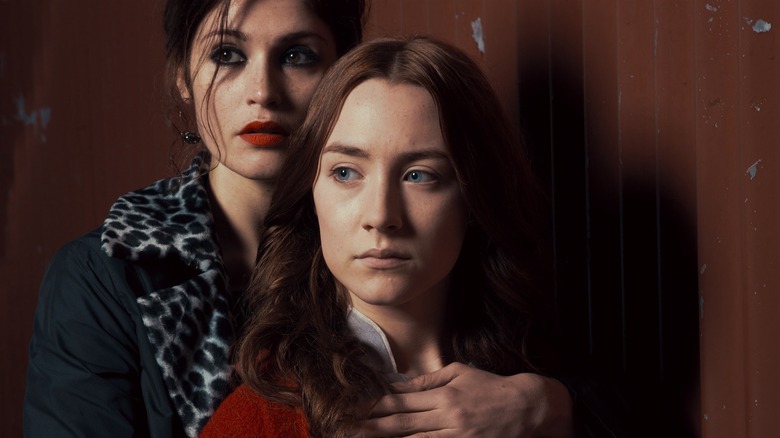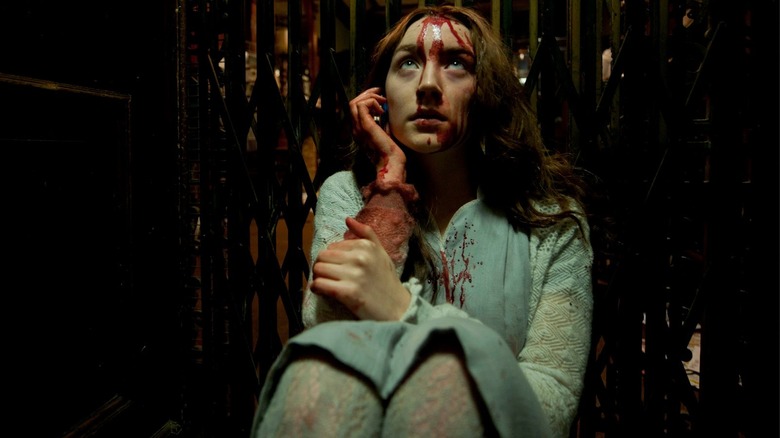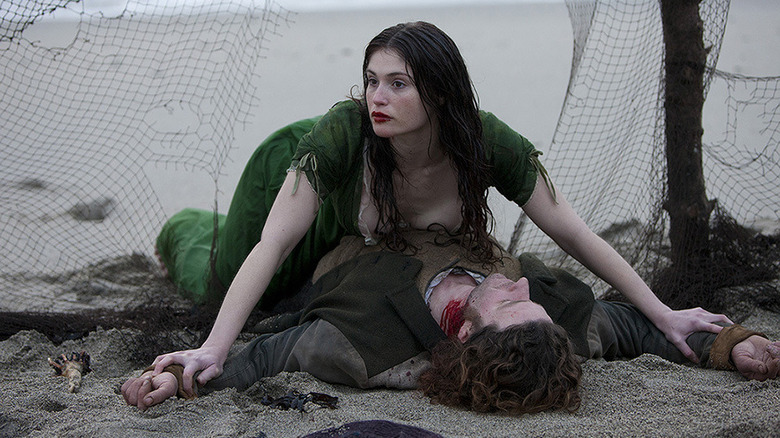Year Of The Vampire: Byzantium Is A Haunting Coming-Of-Age Story With Feminist Fangs
(Welcome to Year of the Vampire, a series examining the greatest, strangest, and sometimes overlooked vampire movies of all time in honor of "Nosferatu," which turns 100 this year.)
Director Neil Jordan is no stranger to stories of vampires grappling with their immortality and lust for blood; he helmed the adaptation of Anne Rice's gothic melodrama "Interview with the Vampire." He takes a more serious approach to "Byzantium," a grim coming-of-age story based on Moira Buffini's play "A Vampire Story." The chilling film centers on a forever 16-year-old vampire named Eleanor Webb (the captivating Saoirse Ronan) and her young mother, Clara (played by a ravishing and passionate Gemma Arterton).
They are drifters who constantly travel from place to place. Their next stop is a ramshackle coastal town that Eleanor has distinct memories of growing up in (her burden is that she remembers everything about her centuries-long past). As the solitary Eleanor wanders the quiet streets, she recalls living at the local orphanage during the 19th century. Although Clara could not take care of her, she kept a watchful eye on her daughter and paid the orphanage a monthly sum for their care. Underneath Eleanor is a deep wellspring of regret and shame which Ronan deftly communicates in her pensive performance.
"Byzantium" has a gloomy atmosphere and feels like a dark fairy tale as it interweaves between the past and present. It stands out for its female protagonists and exploring a relationship dynamic that is rarely seen in the vampire mythos.
What It Brought to the Genre
IndieWire calls "Byzantium" "an elegant alternative to Twilight." Jordan's drama is more eerie and gruesome, and though there is a romantic subplot for Eleanor, love is not the sole focus of her character arc. Like "Twilight," "Byzantium" is a coming-of-age story wrapped within a vampire saga. Eleanor is similar to Kirsten Dunst's character in "Interview with the Vampire," trapped within adolescence for all eternity and perpetually under the wing of her protective mother. They must stick together in order to outrun the mysterious brethren hunting them.
Eleanor's romance with Frank (Caleb Landry Jones) inspires Eleanor to tell the truth for the first time in her life. Throughout the film, she yearns to reveal her vampirism because lying goes against her morals. During her time with the nuns at the orphanage, Eleanor was taught that it was a sin to lie. Her mother, on the other hand, grew up in a brothel and told lies in order to survive. Eleanor is tired of lying about her vampirism and begins telling the truth, even if no one believes her. She eventually writes her life story for an English class and gives it to Frank.
"Byzantium" also adds to the vampire genre by showing a creature who grapples with their thirst for blood. Eleanor resents having to kill others to satisfy her hunger, so she seeks out elderly men and women, appearing to them like an angel to softly guide them to their final rest. It is the only way the devout Eleanor can reconcile her transgressions.
Despite being physically frozen in time at the same age, by the end of the film Eleanor grows up by going out on her own for the first time in centuries. Despite its folkloric sensibilities, "Byzantium" is ultimately a simple coming-of-age story about a young girl torn between her own convictions and what everyone expects of her. She eventually gains the courage to leave her vigilant mother and explore the world.
Vampires Against the Patriarchy
Collider calls "Byzantium" is one of the best vampire films of the 2010s because it shows, "Female vampires can be more than just henchwomen or slaves to a dark lord. They can be emotional, cunning, kind, resourceful, and complex all at once. They can be just as deranged and terrifying as their ghoulish male counterparts." Opposite of the enigmatic and brooding Eleanor is Arterton's Clara, a feisty hustler who will do anything for her daughter. Forced into sex work at a young age, Clara endured a damaging lifetime of abuse.
When she is diagnosed with tuberculosis, Clara takes matters into her own hands and travels to a mysterious island to become a vampire. Later, she learns that this gift was only intended for men who are part of a fraternity called The Pointed Nails of Justice. Eleanor's father Ruthven, whose map to the island Clara stole, takes his daughter away from the orphanage and rapes her for revenge. Clara murders him, then breaks the brotherhood's code by transforming Eleanor into a vampire. Together, they spend the rest of their lives outrunning the male sorority.
Clara is a vampire with a mission to "hunt the powerful and protect the weak." She specifically uses her appetite for blood to dismantle the patriarchal system that mistreats women. It is her way of combating the male supremacy that put her into sex work against her will and exposed her to dangerous situations. In this way, "Byzantium" is a fascinating depiction of female vampires who fight back against the misogynistic structures that oppress them. Rather than focusing on love, Jordan's film explores a passionate bond between a mother and daughter. "Byzantium" uses vampire lore as a backdrop to the story of two women seeking freedom from their traumatic past and suffering at the hands of men.


